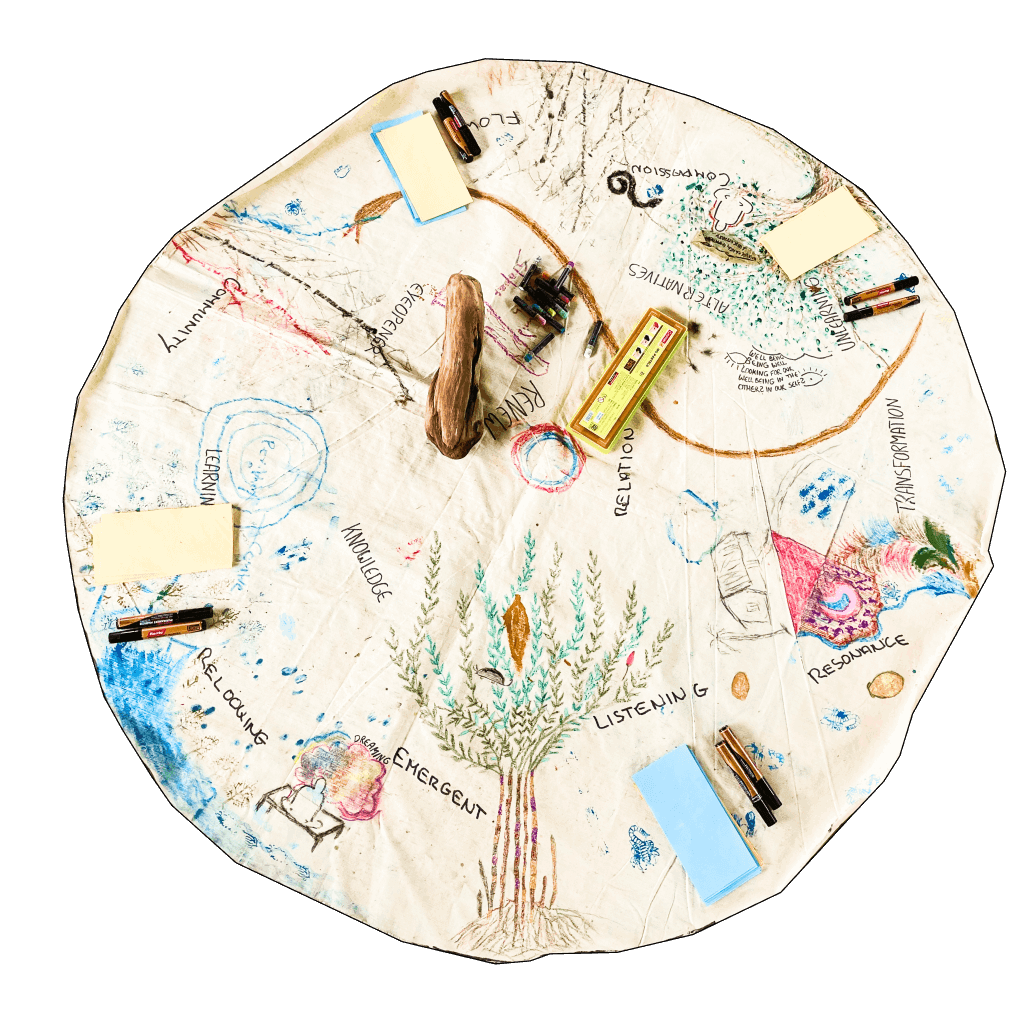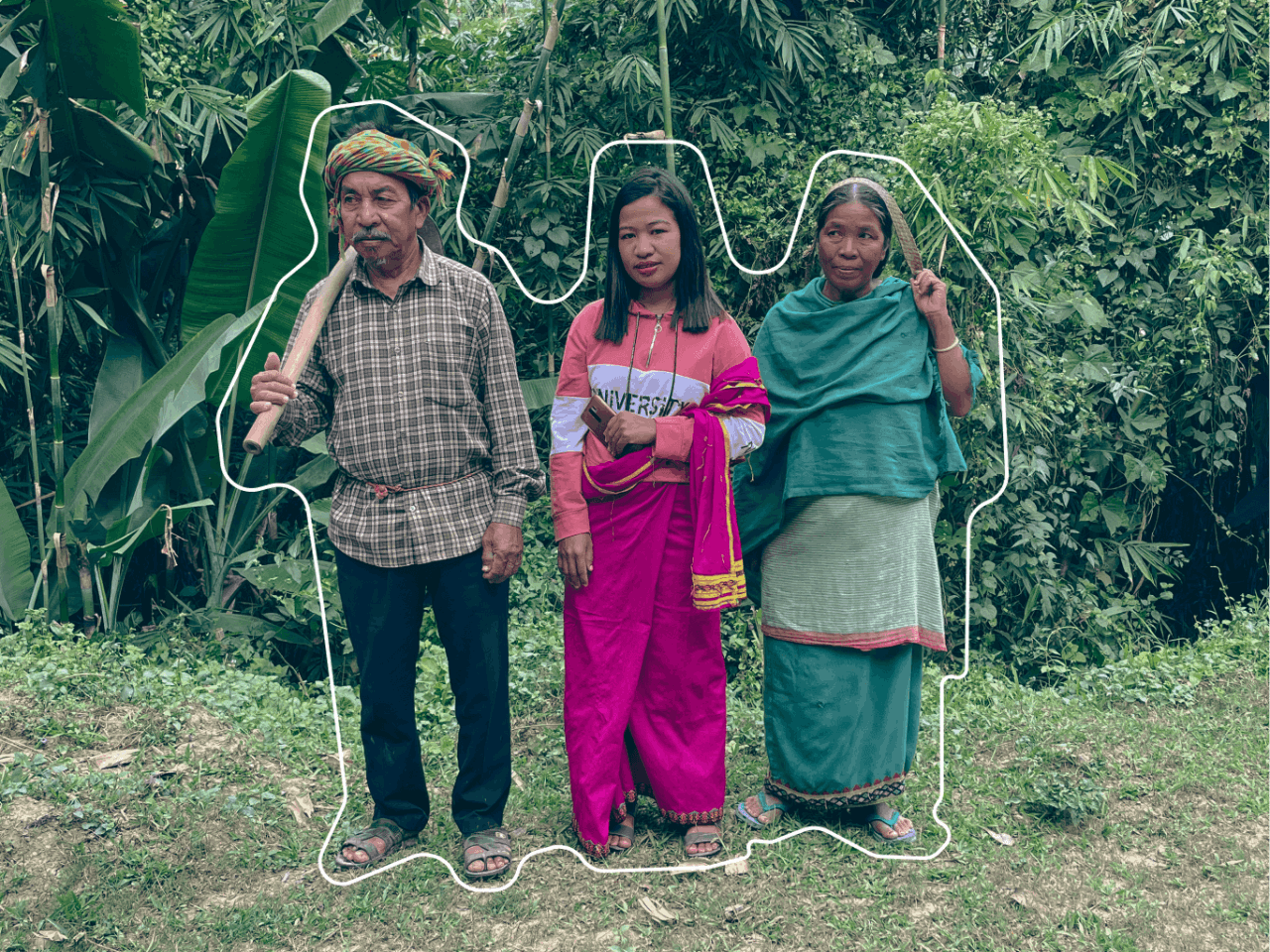Reflective Reverberation: Mapping Traditional Land Use and Documenting Traditional Knowledge in Sampradisa Village, Assam
- Author: Jayanta K. Sarma
- Design and Layout: Mugadha Trifaley
- Photographs: Shrishtee Bajpai
deSchool was an initiative born from the WorkSpace NorthEast process, bringing together diverse voices and indigenous knowledges from across Northeast India. Since 2018, gatherings in Kaziranga, Majuli, Manas, and Haflong have woven a rich, pluriversal understanding of nature and community, challenging exploitative socio-economic forces and fostering a new ecology of knowledge for the region's future.

The deSchool initiative was developed as part of the WorkSpace NorthEast process, which has gathered a multidisciplinary group focused on Northeast India since 2018.
=Meetings held in Kaziranga, Majuli, Manas, and Haflong from 2018 to 2023 have evolved around a pluriversal understanding of nature and philosophy with the goal of creating a new narrative or ecology of knowledges of and for the region.

We, the participants of the deSchool process – an effort culminating from the interactions and discussions of the Workspace Northeast group from 2018 to 2023 – hereby come together for the final confluence.
As a collective of individuals hailing from diverse fields, we converge to focus on devising newer perspectives and develop viable methodologies in assessing the pluriverse of life-worlds and community-life in Northeast India. We hereby acknowledge and propose an Earth Charter from Northeast India, that solemnly declares that we will:
Respect and recognize the priceless natural and socio-cultural heritage existing in Northeast India which has traditionally been passed down through generations by our ancestors. We acknowledge this heritage and consider the people practicing it as our leaders and teachers. We recognise the importance of its sustenance as without this generational wisdom, the direct link between humanity and the Earth will soon be lost.
Be aware of the threats and imminent loss of this heritage and the loss of primary livelihoods centred on natural commons.
We call on to recognise the Jhum societies as the earth guardians and as a living example of earth culture. We resolve to stand and work with them and safeguard the commons which sustains them and thereby all of us.
Recognise living closely with nature and living earth cultures – Jhum societies or other local & indigenous community lifestyles - as a philosophy of living and concomitantly, a viable model for life and livelihood.
Many communities living in Northeast India sustain life in a manner that can offer potential solutions to challenges, both existing and emerging including threats of climate crisis that the world is currently encountering. We call for foregrounding such knowledge as viable measures to address contemporary issues of ecological crises.
Promote the belief and practice of living life and engaging with livelihoods with an understanding of co-existence with non-humans and other-than-humans as well as all elements of nature which provides much required perspectives to resolve our contemporary problems encompassing food & nutrition insecurity, water crisis, pollution, mental stress, economic distress, and facilitate transition to a worldview that respects regenerative economies and ecologies.
Respect and recognise the philosophy of indigenous communities that considers living with and within nature as a way of life.
Recognise, share, and privilege economies rooted in the idea of commons
Recognise and realise that nature is fundamentally ingrained into every facet of our lives and institutions. Valuing nature, therefore, must be a locus around which we ought to organise and consolidate our personal, social and economic life.
To encourage conversations between principles of cultural sensibilities and bio-ethics on one hand with economic systems at work on the other in order to inculcate a model of regenerative development.
To sustain indigenous customs of conservation that includes belief systems and practices which foreground the philosophy of life and regeneration; thereby conserving seeds, soil, trees and other species as a ‘way of life.’
Respect the diversity of culture, languages, belief systems, oral practices, and collective spirit of living as and with ‘commons.’
Call on multiple stakeholders, especially the youth, to act as responsible and empowered agents of change in upholding the philosophy of indigenous life of reciprocity and strive towards incorporating these values into modern institutions and places in an attempt to constitute a collective life.